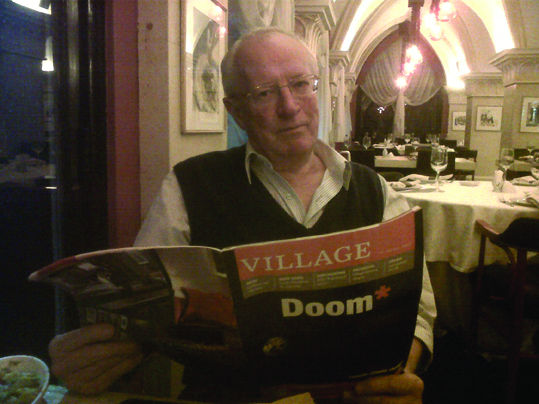
By Joseph de Burca.
It is no exaggeration to say that Robert Fisk, who has passed away, was one of the finest journalists of the last half-century. He reported on the Troubles during the 1970s for The Times of London before it was taken over by Rupert Murdoch, produced a book on the 1974 Ulster Workers Council strike and another on Irish neutrality during World War II. He had the dignity and self-respect to walk away from The Times after Murdoch began to interfere with his reporting. He soon became recognised as an international authority on the Middle East among his many other achievements.
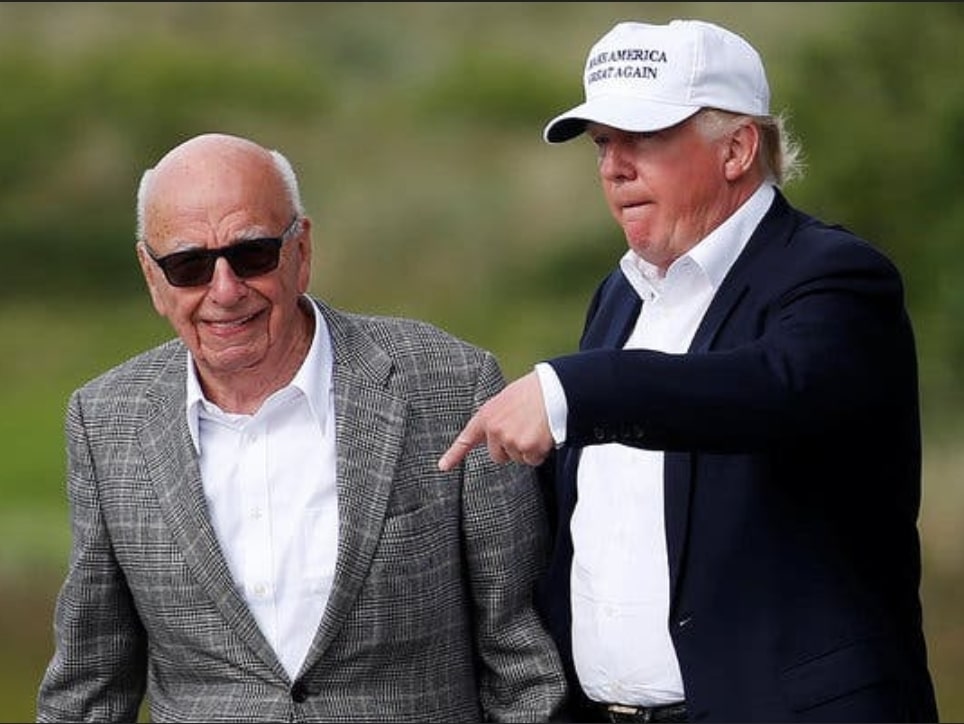
He purchased a house in Dalkey, County Dublin and became an Irish citizen. Clearly, he relished the intellectual freedom of the country and became a regular guest on the Pat Kenny and other radio shows. Hundreds of thousands of lrish people benefitted from his objective and insightful analysis of world events unlike the many millions who were fed drivel and propaganda by the Murdoch media, especially in the UK and USA.
Significantly, he became a fearless opponent of the dirty tricks deployed by various Western intelligence services in their efforts to manipulate the press. He first clashed with these shadowy forces in Ireland in his 20s.
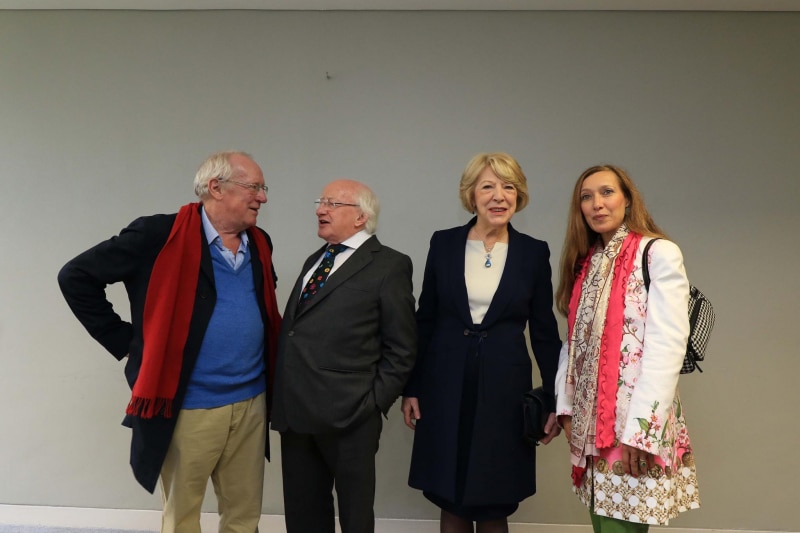
1. Fisk exposed the Loyalist paramilitary organisation TARA which was run by the ‘Housefather’ of Kincora Boys’ Home, William McGrath
Although it is not mentioned in any of the many glowing – and well-deserved – tributes from around the globe, Fisk was one of a tiny number of journalists who attempted to expose the activities of Tara, a Loyalist paramilitary group. Tara was led by William McGrath, a long-time friend and associate of Ian Paisley, the leader of the Democratic Unionist Party (DUP). McGrath was probably the person who introduced Paisley to the notion that the Protestants of Northern Ireland were the descendants of one of the lost tribes of Israel (i.e. British-Israelites). McGrath, who was nearly a decade older than Paisley, met Paisley while the latter was in his early 20s. McGrath was convicted in 1981 of the sexual abuse of residents at Kincora Boys’ Home in Belfast. (See also: Blackmailed? [Updated Version]
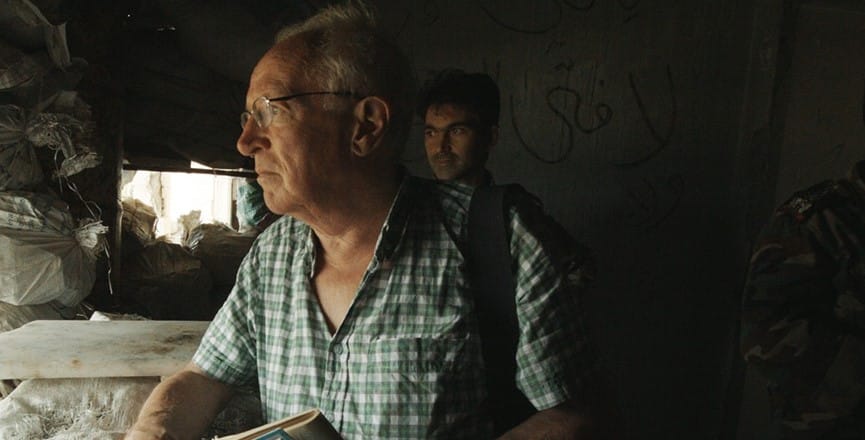
The man who supplied Fisk with the information about Tara was Captain Colin Wallace, a PSYOPS officer at British Army HQ at Lisburn. Wallace often supplied journalists such as Fisk with documents and briefings. This was always done on orders from his superiors as part of his job.
Fisk published a report about Tara in London’s New Statesman magazine on 19 July 1976.
In the report he explained that Tara had been the subject matter of a private British Army report and described it as “well-armed” with links to a Northern Ireland political party. He drew attention to the fact it was also “perfectly legal’. He then proceeded to quote from a document supplied by Wallace which read as follows: “Commanding officer uses non-existent evangelical mission as a front…Tara organised initially in platoons of 20, now probably in companies, and drawn almost exclusively from members of the Orange Order, each platoon has a sergeant/QM (quartermaster); and IO (Intelligence Officer)”.
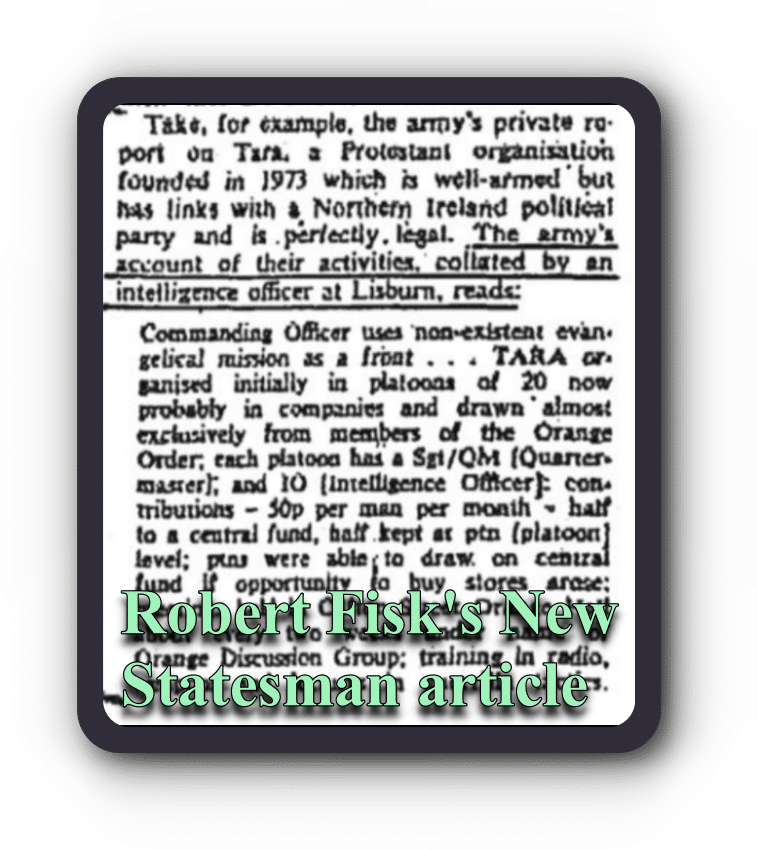
2. MI5 exploits the provision of ‘restricted’ documents by Colin Wallace to Robert Fisk to destroy Wallace and protect a paedophile network.
At the time William McGrath was acting as an agent of MI5 which is attached to the Home Office. Previously, he had been an agent of MI6 which is attached to the Foreign Office.
Ian Cameron, a senior MI5 officer based at MI5’s station at Lisburn, had been alarmed at Wallace’s attempts to expose what had been going on at Kincora. Cameron was in overall charge of running the sordid and utterly reprehensible Kincora operation at ground level in the mid-1970s.
McGrath and the Warden of Kincora, Joseph Mains, had supplied boys to other Loyalist terrorists such as John McKeague, who was blackmailed and recruited by MI5 in 1976. For further details about McKeague and MI5 see: The Anglo-Irish Vice Ring Chapters 8 – 10 The MP and leader of the Official Unionist Party, James Molyneaux, was also an abuser of underage males and a friend of McGrath see: JAMES MOLYNEAUX AND THE KINCORA SCANDAL. A senior figure within the DUP, “the Wife Beater” was also compromised by his association with McGrath and McKeague. Enoch Powell, Sir Anthony Blunt and others were likewise involved. Kincora was merely part of a wider Anglo-Irish Vice Ring. For details about Powell see: Suffer little children
Cameron reported to Denis Payne, the Director and Co-ordinator of Intelligence (DCI) at Stormont Castle. Payne was fully aware of what was taking place at Kincora and at other childrens’ homes. Payne was also an MI5 officer.
Some officials at Stormont such as Peter England and John Imrie were themselves paedophiles who raped children in care in Ireland. (See also: John Imrie, MI5’s Flasher-General
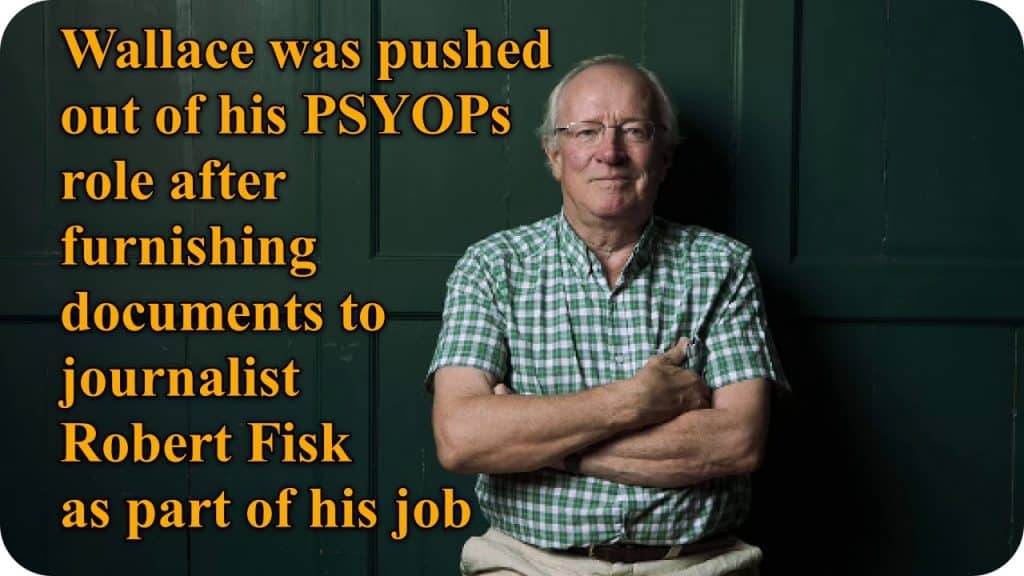
Unlike MI5, there were some officers in the British Army such as Wallace and his superior, General Leng, who were quite prepared to expose the vile abuse of children in Ireland. Capt. Brian Gemmell also deserves credit for his part in uncovering what was afoot.
MI5 set out to destroy Wallace to preserve the Kincora secret in 1975. They made their move in early 1975 after Wallace sent some papers to Fisk. Crucially, he had done so – as he had always – with the permission of his military superiors.
Cameron also made a formal complaint against Wallace for allegedly “breaching security by briefing the press about Tara and McGrath”, Wallace has explained. “This was based on a piece that Robert Fisk wrote for The New Statesman… Cameron knew, of course, that I had been briefing the press about McGrath since 1973 at the request of my Army superiors”. Wallace’s boss at HQ NI in 1974, Peter Broderick, is on public record saying that he initialled a 1973 press briefing document about Tara that Wallace used and instructed him to disclose it. The document was also initialled by Lieutenant Colonel Peck, the then head of PSYOPS.

“Cameron”, Wallace believes, “was worried that my attempts to expose McGrath – at the behest of my superiors – was a threat to what MI5 were doing with McGrath and Tara”.
Wallace has also revealed that it “was later made clear to me by a totally reliable source that the ‘leaks’ allegations were just a means of having me removed from the Province because the NIO – particularly MI5 – wanted to take full control of the so-called information war. In effect this is what happened!”.
MI5 had other motives for destroying Wallace including his refusal to participate in treacherous propaganda campaigns against the British Labour Party. (Hugh Mooney, a graduate of Trinity College Dublin and a one-time sub-editor at The Irish Times participated in the campaign against the British Labour Party. See: Licence to deceive. See also Traduced (updated version): John Hume was the victim of a campaign of character assassination perpetrated by the British Secret Service, MI6, and was placed under MI5 surveillance in Dublin with the assistance of the Gardaí.
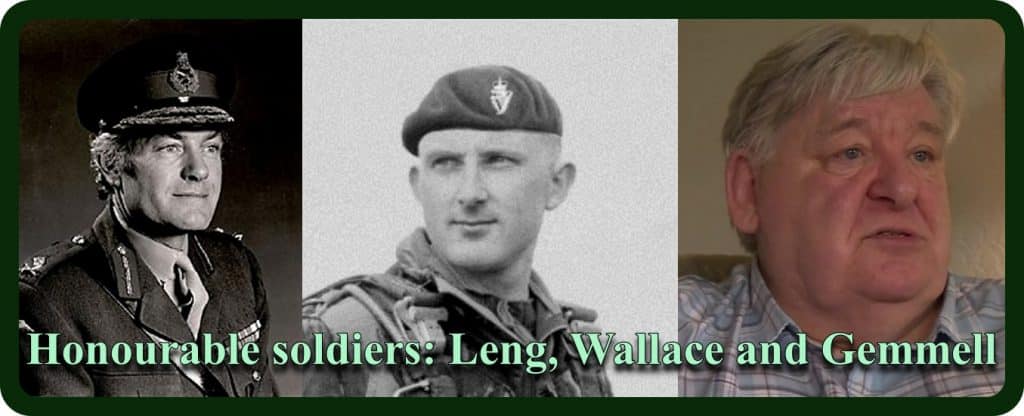
3. Ian Cameron’s Report to his MI5 Superiors about Fisk and Wallace.
There is irrefutable proof that Cameron was alarmed about the information which Wallace had passed to Fisk: Cameron furnished a report to MI5 in London on 22 April 1976 accusing Wallace of a breach of security for having briefed Fisk about TARA.
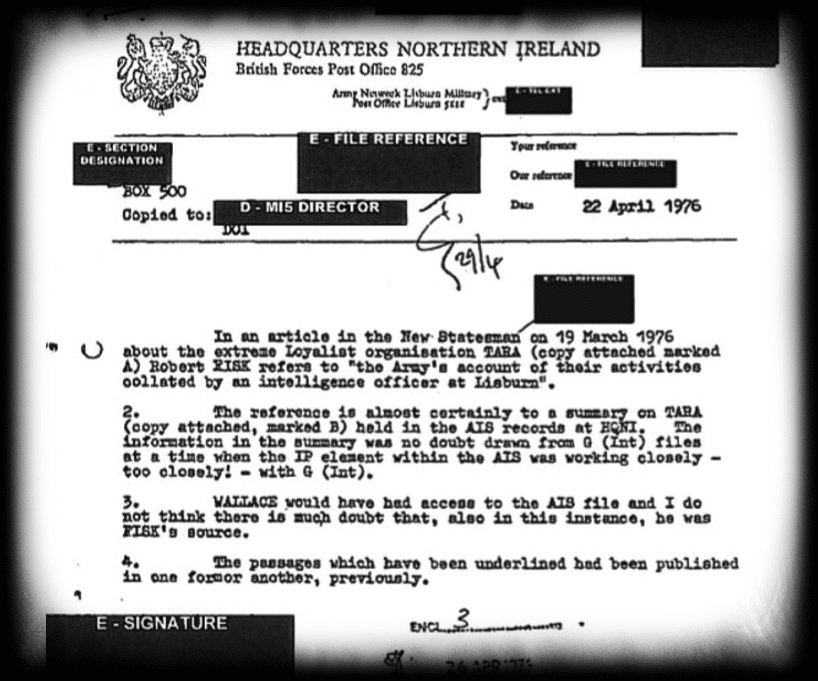
Cameron’s report is reproduced in the picture above, although his name has been redacted. The reference to “Box 500” is to MI5.
4. The harassment of Fisk by a British ‘diplomat’ in Dublin.
Fisk was harassed by British authorities after Wallace passed certain ‘restricted’ documents to him. ‘Restricted’ was the lowest level designation for these types of documents. They did not relate to Kincora, Tara nor McGrath.
Fisk was visited by a ‘diplomat’ from the British embassy in Dublin called Michael Daly. Daly had a role in monitoring the media in the Republic: he was the same ‘diplomat’ who was able to report to London details about instructions which were being issued to the editors of Irish newspapers owned by Tony O’Reilly about thwarting the political rehabilitation of Charles Haughey in the wake of the Arms Crisis, a story for another day.
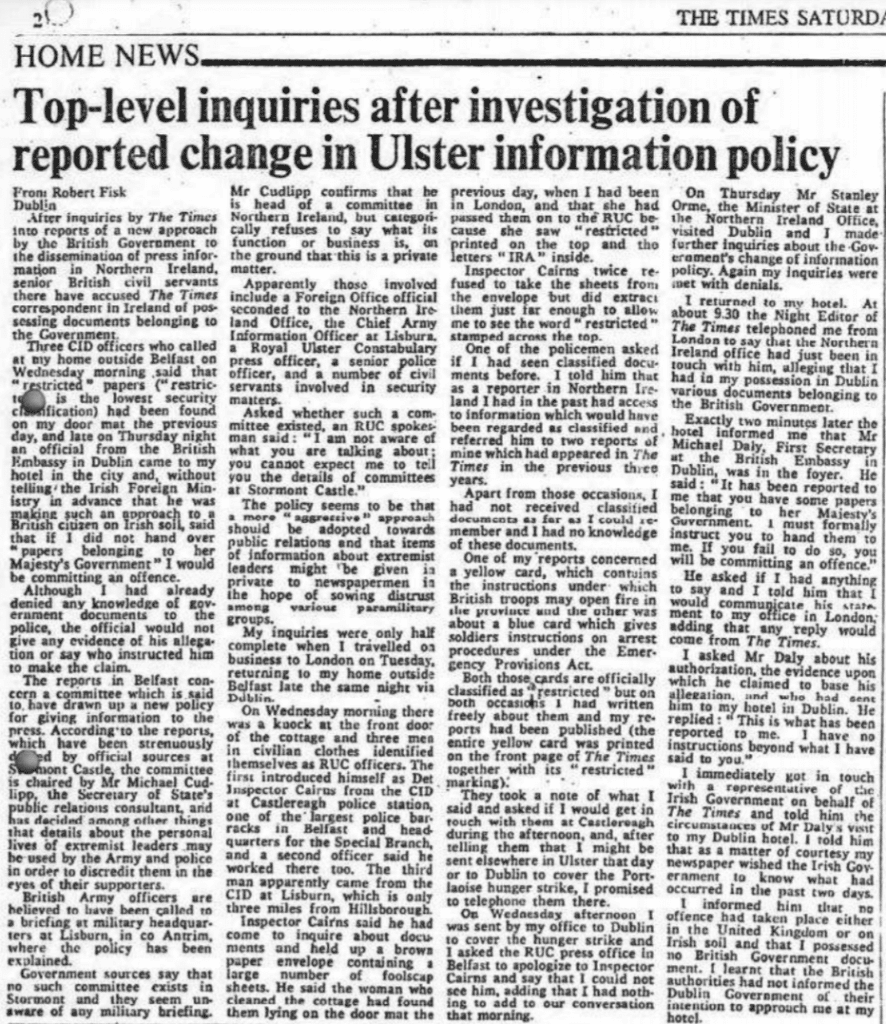
The article by Fisk above – 8 February 1975 – gives his account of the harassment he experienced after Wallace passed materials to him.
A more legible copy of the 8 February report is reproduced at the end of this article.
5. MI5 reported that Fisk was ‘acting in Wallace’s defence’
I can not help thinking that Fisk’s article was written with two objectives in mind. First: he was acting in Wallace’s defence warning us that we should keep our heads down…
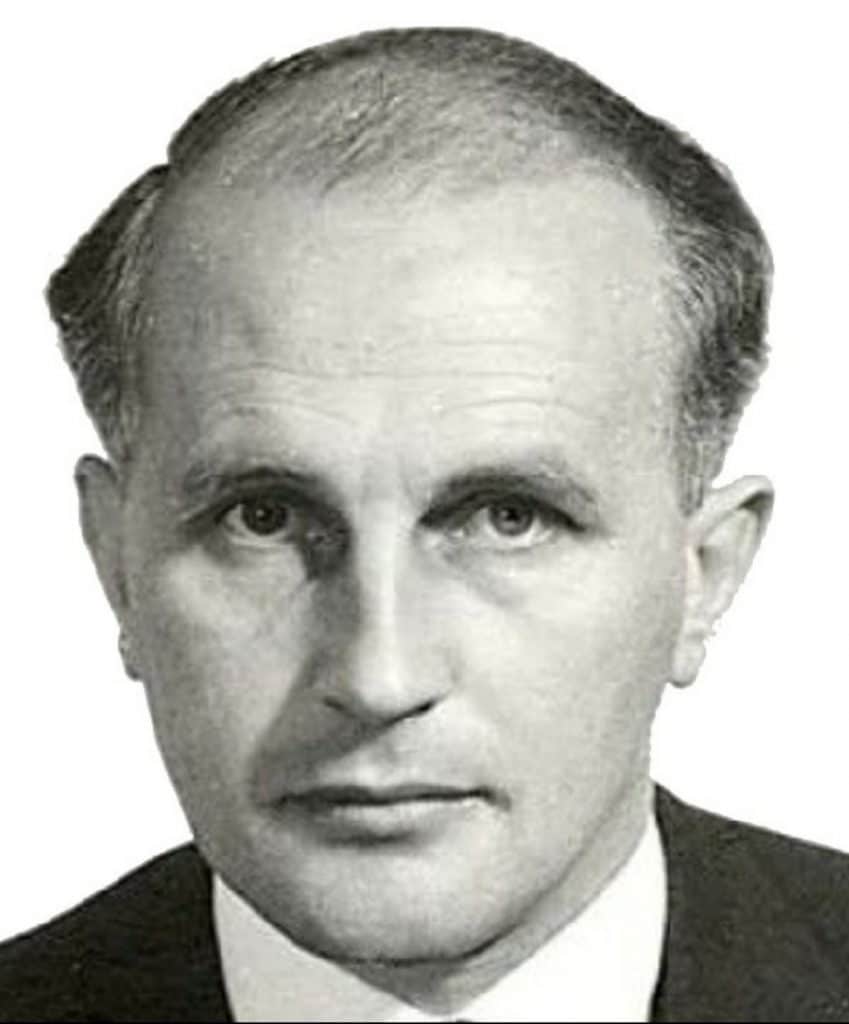
the most corrupt lawyer in Britain in the 1970s and 80s.
On 16 April 1975 Ian Cameron wrote a letter to Bernard Sheldon, who acted as legal adviser to MI5. Sheldon was arguably the most corrupt lawyer in Britain at the time: he abused his office to protect paedophiles from prosecution and destroyed those who stood up for the children. In the letter Cameron stated, ‘I can not help thinking that Fisk’s article was written with two objectives in mind. First: he was acting in Wallace’s defence warning us that we should keep our heads down…’ (See paragraph 5 of the letter reproduced below.) What was it that Cameron felt was the danger posed by Fisk’s article? There were a number of factors at play here, one of which was the mention by name of Michael Daly. Daly was at the very least a ‘diplomat-spy’ if not an undercover member of MI6 and the appearance of his name in a newspaper in connection with ‘restricted’ files and media manipulation was a disaster for the intelligence community and and the embassy.
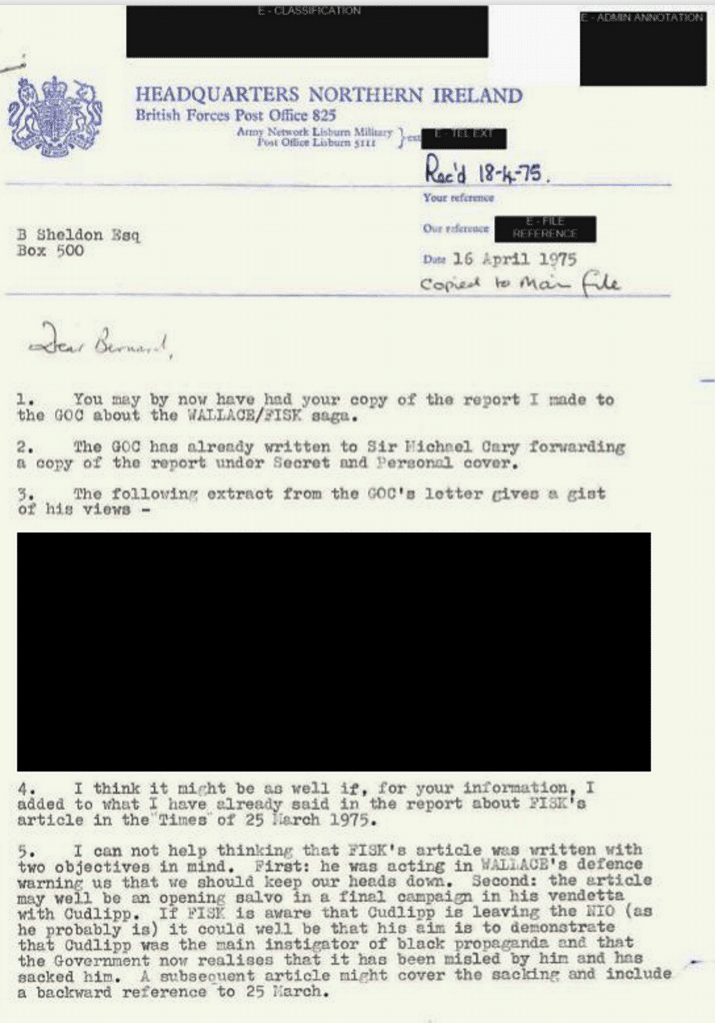
The only contact Colin Wallace had with Bob Fisk after these ugly events was when he appeared on a RTE radio discussion which was hosted by Tom McGurk a number of years ago. Ruairí Ó Brádaigh, a founding member of the Provisional IRA, also appeared on the broadcast. Wallace and Fisk exchanged some pleasantries but Wallace did not use the opportunity to ask Fisk to elaborate on what else he knew about the affair, i.e. anything that he might not have included in the newspaper article of 8 February 1975. Nor did Wallace follow up with a private discussion on another occasion. How much Fisk might have been able to add to the report he published is now a mystery.
6. Lies and Perjury.
MI5 and the Northern Ireland Office caused lie upon lie to be told in the House of Commons about the affair during the 1980s. In particular, MI5 orchestrated a campaign to deny that Wallace had been involved in psychological operations against paramilitaries. Hence, it was argued, when he passed the ‘restricted’ documents to Fisk, he had been in breach of the Official Secrets Act. That, of course, was a lie.
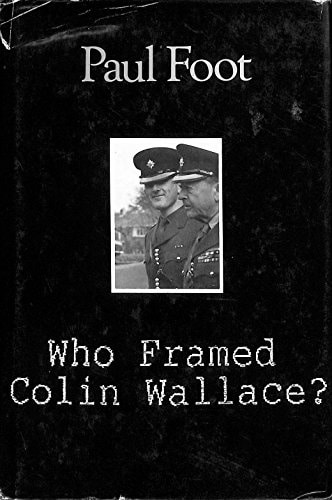
A few years later Wallace was framed for manslaughter based on perjured evidence. His conviction was subsequently overturned by the Court of Appeal. One of the factors which emerged during the appeal was that a corrupt Home Office pathologist Dr Ian West had committed perjury based on information provided to him by intelligence sources.
Wallace eventually received compensation for the multiple wrongs occasioned to him.
West died soon afterwards and was not prosecuted for perjury. Had a conviction taken place, it is anyone’s guess how much of MI5’s dirty linen would have been exposed to daylight.
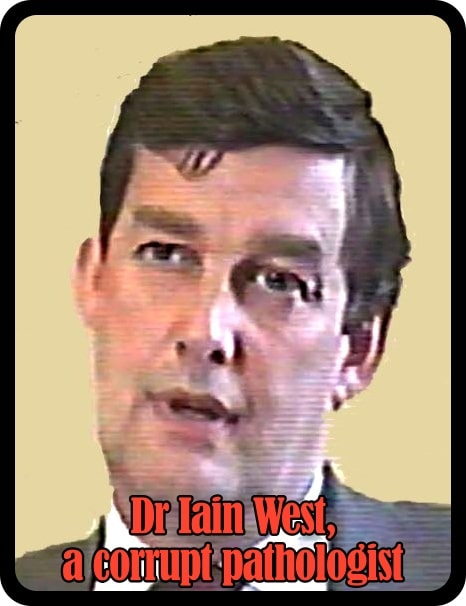
7. The lamentable Independent Inquiry into Child Sexual Abuse.
Sadly, the Independent Inquiry into Child Sexual Abuse in London has ignored a mountain of evidence about the Anglo-Irish Vice Ring and the child abuse perpetrated by Westminster MPs such as Enoch Powell, James Molyneaux and others. IICSA is led by the supremely disinterested and utterly ineffectual Prof Alexis Jay.
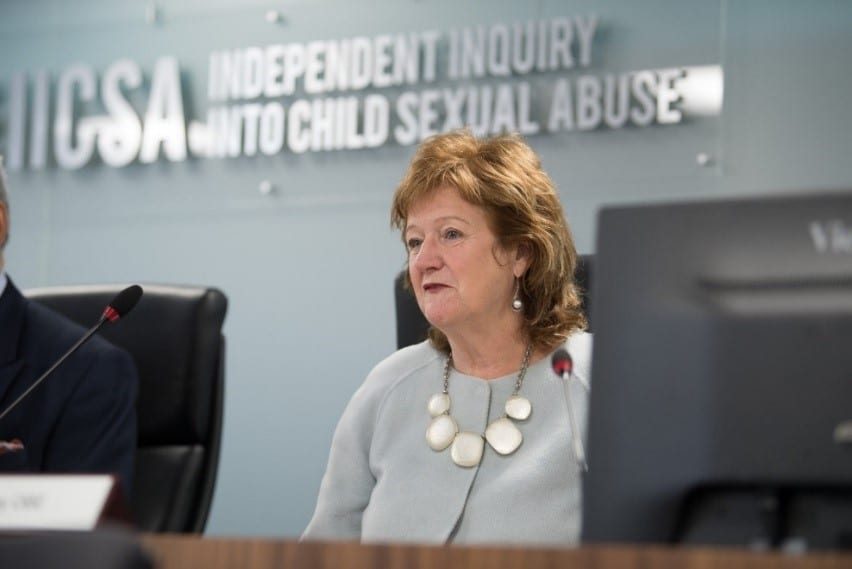
Readers interested in details about the Anglo-Irish Vice Ring can visit an 80,000 word online book which is posted on this website. The book begins at: The Anglo-Irish Vice Ring. Chapters 1 – 3.
8. Journalists who did not follow the example of Robert Fisk.

Bob Fisk left The Times of London after Rupert Murdoch began to interfere with his reporting. He never lost his distaste for the efforts of governments and their intelligence services to manipulate the media either. Meanwhile, many of his contemporaries were content to play the game on behalf of MI5, MI6 and the CIA.
The Times was not the only newspaper which Murdoch bought and corrupted. He employed an army of editors and journalists who did not have the same appreciation of journalistic ethics, independence, truth telling and integrity displayed by Fisk. One of them – still to be seen on the BBC pontificating about transparency and integrity – once served as the editor of one of Murdoch’s publications. He was in charge when a report about the Kincora scandal appeared in the first edition of his paper. A correspondent with undeniable links to the British Intelligence community who was also working at the paper spotted the Kincora article and rang the Ministry of Defence (MoD) to tip them off. An official at the MoD then rang the editor. Unlike Fisk, the editor was prepared to perform as a puppet of Murdoch and his shady allies in Whitehall and keep his readers in the dark: he had the piece removed from all later printings.
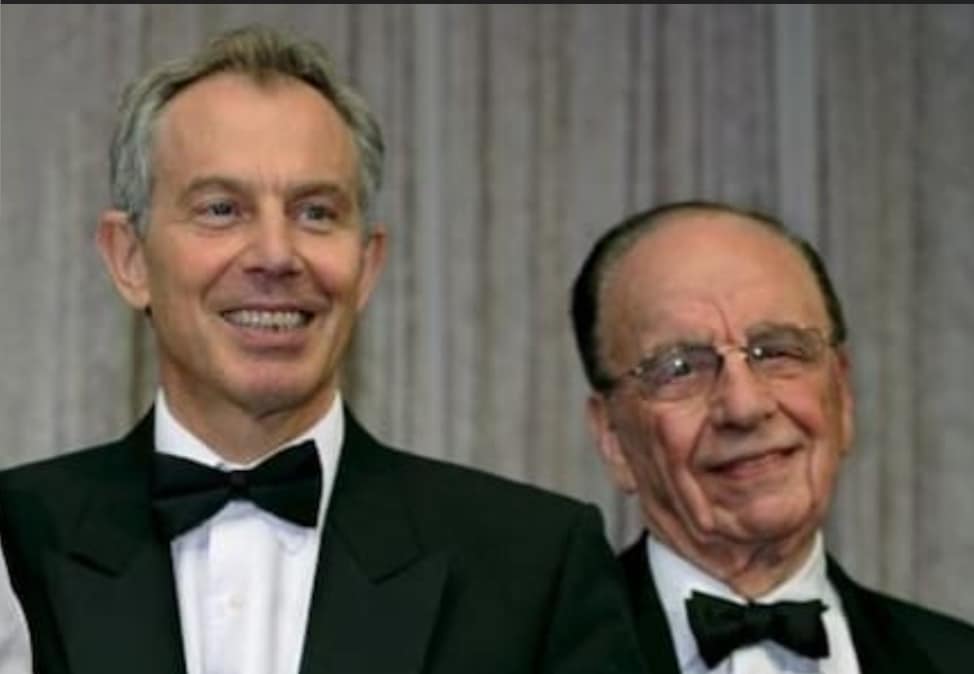
The abuse of the residents of Kincora Boys’ Home was merely the tip of an iceberg. Sadly, the exposure of McGrath and Joseph Mains did not end the rape of children by the wider network of which they were members. If the editor of this particular Murdoch publication had decided to support the research of his reporter rather than cover up for Whitehall, it is a certainty that many other children who were abused in Britain and Ireland would have avoided their terrible ordeals. The same blame and shame applies to the correspondent who betrayed his colleague by contacting the MoD about the story.
If there were less people like the Murdoch editor and his ilk, and instead more like Fisk, the public might have more faith in the media. Instead, we live in a world where the likes of Donald Trump routinely manipulate millions with allegations of ‘fake news’ and find an audience ready and willing to lap it up.
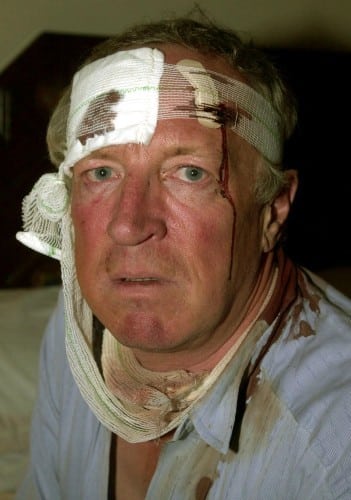
Appendix: A more legible copy of Bob Fisk’s report of 8 Feb 1975




